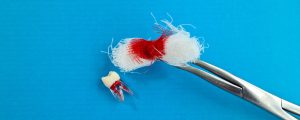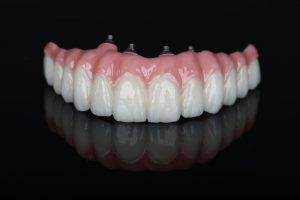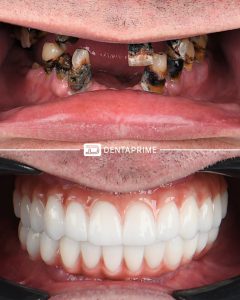Whether you have suffered serious trauma, lost your teeth because of ageing or lost them because of an oral disease, dentures have been serving as a tooth loss solution for ages. The earliest use of dentures can be traced back to the 7th century BC. At that time Etruscans used to fashion them from animal and human teeth. With the end of their civilization, however, this ancient practice was ended. However, a thousand years later it reemerged again because tooth loss and the need to deal with it has been existing since the dawn of time. In 1700 the use of dentures reappeared again. Dentistry at that time was still not that developed so people rarely reached their 50s with all of their natural teeth remaining.
During the Victorian era solutions like ivory or porcelain teeth were not uncommon. Still, the practice of denture-making with human teeth continued at the time and even had a name – Waterloo Teeth. They were named after the famous battle and more than 50,000 died at the battle. These men were young and relatively healthy, so their teeth were the perfect fit for the job.
Later on, they were substituted by vulcanite teeth – tooth loss solutions made of flexible rubber. At that time false teeth were made affordable not only to the wealthy but to the poor as well.
Nowadays, traditional removable dentures are not only way more comfortable and better looking than their predecessors, but they also are affordable to anyone and can be even obtained through the NHS.

They should also provide advice on what to eat after dental implant surgery, and what to avoid so that you can heal faster after the dental implants. Despite being a pretty straightforward treatment, dental implantation is a surgery after all. That being said, it’s only natural to experience swelling (especially if you’ve had bone grafting or sinus lift), bruising, minor bleeding, headaches and other types of discomfort.
So, if you’re still experiencing mild pain after dental implants, read further to learn more about quicker recovery after implant treatment and home natural remedies to relieve post-operative pain and swelling.
Contents
Dental health and dentures
Modern dentures are widely accessible to people who suffer from tooth loss. They offer solutions that vary from partial to complete dentures, depending on your specific needs. Complete dentures are normally needed when teeth are missing from an entire jaw, and partial ones can serve as a substitute for a few missing teeth only.
Depending on the time of the placement of the dentures, they may be either immediate or conventional. Immediate dentures are placed right after tooth extraction so that you don’t remain toothless after the procedure.
However, in time, the bone and gums underneath will inevitably shrink. This happens because the teeth that used to serve as an anchor before and preserve you from bone loss are no longer there. This is why the downside of immediate dentures is that they will take more adjustments before they can properly fit as opposed to conventional dentures.
What are dentures made of ?
Traditional removable dentures are made of an acrylic compound which is generally stronger than regular plastic. They comprise two parts – a gum-coloured base and artificial teeth. Dentures are created after the moulding of your jaw in a laboratory by a skilled dental technician. Some clinics can either have an in-house dental laboratory like Dentaprime F3T or have the fashioned in a partner laboratory elsewhere.
A dental technician in the UK needs to have either the BTEC National Diploma in Dental Technology or BTEC level 3 qualification in dental technology to possess the proper qualification for denture making.
What is the process of getting complete dentures:
- Initial examination
- Treatment plan preparation
- Taking impressions
- Bite recording
- Denture try-in
- Denture fitting
What do dentures feel like?
If you’re new to this you will notice that there are some challenges involved in getting used to living with dentures. There will be the feeling of a foreign object in your mouth. Moreover, excess salivating is not uncommon, so you would need to help your body get accustomed to this dramatic change by swallowing more often for example.
If you have a hard time adjusting to life with removable dentures, here are 5 tips that can help you have a smoother transition:
- Maintain excellent oral hygiene – brushing your dentures, gums and tongue. If you fail to remove food particles from your oral cavity, in time they will start to rot and create a bacteria-friendly environment. This in turn may cause bad breath and oral diseases like gum disease
- Don’t wear your removable dentures at night – avoiding sleep with your dentures can slow down the bone resorption process by alleviating the pressure off the gums. Still, if you want to permanently stop the process of bone loss – dental implants are the way to go. With further bone loss, your dentures may no longer fit properly and will increase the risk of slipping and reducing comfort when eating. Lastly, not sleeping with your dentures will prevent bacteria development and bad breath.
- Always soak your dentures when you’re not wearing them – just like your natural teeth are protected by saliva, your dentures need to be submerged in water if you’re not wearing them otherwise they would crack
- Talk more – practice speech at home or read out loud. Your entire face will have to adjust to this change, so you need to allow your lips, tongue and cheeks to get accustomed to denture-wearing. Furthermore, this exercise would help you get over any difficulties that you may have with pronouncing certain words and phrases.
- Be careful with slipping dentures – abrupt movements like laughing, coughing or sneezing, and even smiling can cause your dentures to slip. Fortunately, dental implants can resolve these problems as they are permanently embedded in your jawbone. The fixed teeth over them do not shift or move around in your mouth.
Are your dentures letting you down?
Dentures may be a budget-friendly solution to tooth loss, however, in all honesty, they’re not the optimal solution to tooth loss.
If you’re wearing dentures right now, you’re probably suffering from at least one of these very common problems:
- Trouble keeping them in place
- Difficulty eating
- Problems with speech
- Soreness or pain
- Excessive saliva
- Bad breath
- They don’t feel like they fit well.
All of these issues are present in most people who remain toothless or choose to wear removable dentures as opposed to dental implants.
Not only does tooth loss cause functional problems, but it also shatters your confidence as you become more self-conscious and limits your social interactions.

At the Dentaprime F3T Dental Implant Centre in Stratford, London, we often see patients who feel let down by their dentures, having believed that they would be the perfect solution to missing teeth. Moreover, we also witness the consequences of long-term denture wearing that have caused more harm than good like gum disease as a result of poor denture maintenance. As a direct consequence, most patients suffer further bone loss which ultimately has caused their dental implant treatment to cost a lot more or made it impossible.
Why is that? With advanced bone loss, the options are not many. If caught on time, it can be remedied with bone graft procedures. In the worst-case scenario, it may no longer be an option if the jawbone has shrunk to the point that it is beyond saving.
The permanent solution to tooth loss
Patients who have worn dentures for a long time, often find that they make them miss their natural teeth even more.
Wouldn’t it be great if there were a way to have them back? Sadly, this is not an option, but the next best thing to natural teeth is dental implants. They are a permanent solution to missing teeth and offer the same looks and functionality.
You don’t have to worry about your teeth slipping when eating or sneezing, or forgetting about removing them at night Forget the stress of going to a restaurant and worrying that your teeth may fall out while trying to enjoy your meal, or living with constant soreness from prosthetic teeth that never fit just right.

Bringing it all together
Fixed Teeth in a Day has become a firm favourite of denture wearers, not only because it provides an exceptional solution to all tooth loss-related problems, but also because it’s fast and extremely affordable. Removable dentures may offer a cheap short-term solution, but they could cause more harm than good in the long run unless you look after them properly and plan your day around tending to them. In turn, looking after dental implants is the same as looking after your natural teeth – just standard brushing and flossing – no soaking, brushing individually or always pending adhesive to keep them in place.
If you’re uncertain whether dental implants are the correct fit for you – get a free online consultation with a dental expert. You’ll get advice on how to restore your smile for good and massively improve your overall quality of life.


